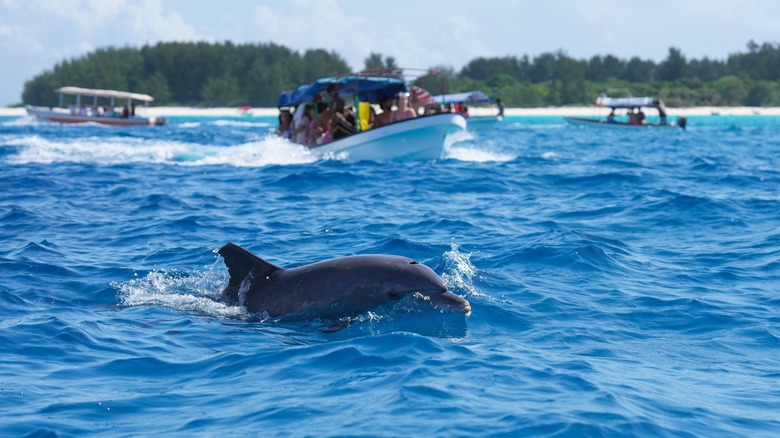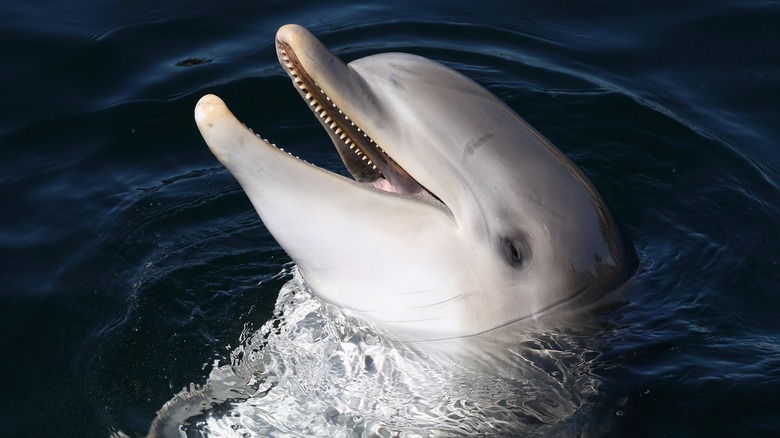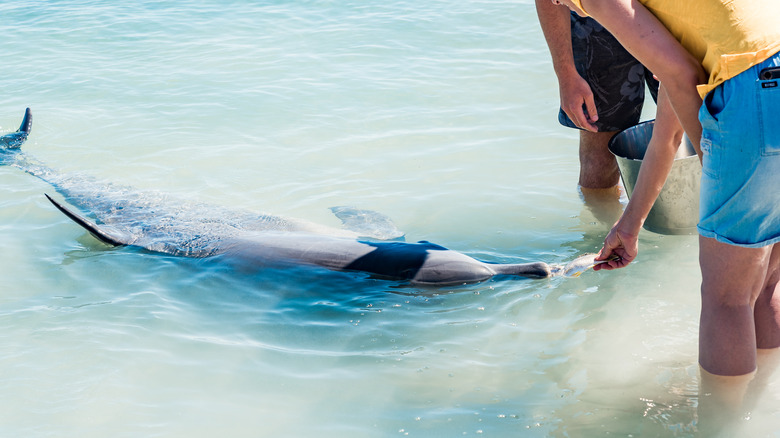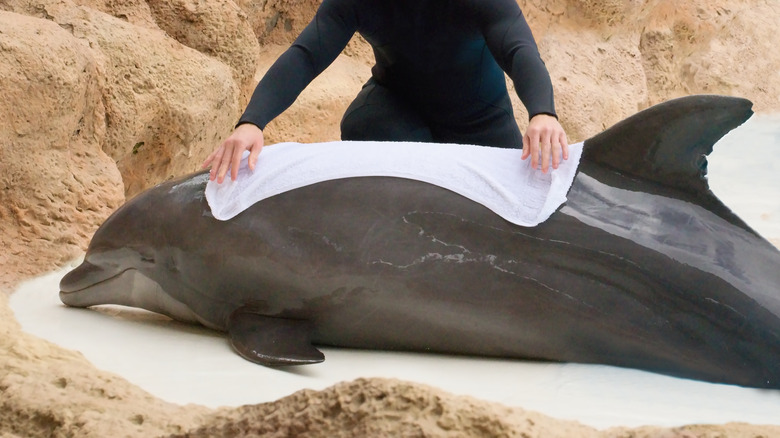What You Should Do If You See Dolphins In The Water With You
Dolphins are not only incredibly smart but are also magnificent to see up close in the wild. Because of this (and because pretty much everyone who grew up in the 90s thought about becoming a marine biologist), having an up close and personal interaction with dolphins may seem like a dream come true. However, it is important to know that dolphins are wild animals, and they don't always enjoy interactions with humans. They may also become aggressive when stressed by these interactions. In fact, dolphins have been known to break ribs, bite, and even pull people underwater.
So, if you ever find yourself in the water with dolphins, what should you do? According to the NOAA, you should never approach or try to interact with a wild dolphin. Many studies have shown that human interaction with dolphins has negative effects on the animals and may even cause a reduction in their population over time. Furthermore, some dolphin species, like spinner dolphins, are actually sleeping when they are in shallow water near the shore. Approaching them can disturb their sleep and frighten them, causing unnecessary stress that may lead to them abandoning the area completely.
Never touch dolphins
In general, it is recommended to maintain a distance of 50 yards between yourself and wild dolphins. However, dolphins are curious animals and may sometimes approach humans. So, what should you do in that situation?
The most important thing to remember if a dolphin approaches you is to never reach out and touch or grab it. This is important because, although these mammals are portrayed with almost pet-like qualities in many movies and TV shows, in real life, they are wild animals that don't react well to being touched. On top of scaring away the dolphin, touching one is illegal in the United States. If caught you may be fined under the Marine Mammal Protection Act which makes it illegal to harass or annoy dolphins in any way.
As dolphins are naturally curious creatures, in rare cases, they may initiate contact with you. Dolphins have been known to nudge at the hands and feet of swimmers. Even in this situation, you still don't want to reach out and touch the dolphin as it may become startled or feel threatened.
Stay still and quiet
Besides not reaching out to or touching the dolphin, the best thing you can do if you encounter a dolphin while swimming is to stop moving and stay as still and quiet as possible. If the dolphin is at a distance, remaining still is a good way to ensure that the animal doesn't see you as a threat and will also help it more quickly satisfy its curiosity and move on. You will also want to remain quiet and not shout or make loud noises. The reason for this is that loud noises may startle dolphins and can also separate calves from their mothers.
Similarly, you should be careful of loud noises when viewing dolphins from a boat because the sudden starting or revving of a boat engine can also cause dolphin mothers and calves to startle and separate. This is why the NOAA recommends always keeping your boat engine at "no-wake speed" when dolphins are near and then shifting to neutral if the dolphins choose to approach your boat.
Slowly back away
If you are in the water and a dolphin doesn't leave after you've tried staying still or if it approaches you, the best option is to slowly back away. Although dolphins normally approach out of curiosity, they may also approach when aggravated by your presence. Aggressive dolphins typically attack humans as a warning. While these attacks are rarely fatal they can cause serious injuries.
Because of the public perception of these animals, signs of dolphin aggression are often incorrectly interpreted as playfulness. Some signs that a dolphin feels threatened and wants you to leave include looking at you with an open mouth (often misinterpreted as smiling), adult dolphins arching their backs in defensive postures in front of calves, repeated tail or head slapping on the surface of the water, and swimming quickly past you. If a dolphin engages in any of these behaviors, the best option is to start slowly swimming away or get out of the water and back to safety.
Never feed dolphins
Whether you are in the water or on a boat, feeding dolphins is never a good idea. The feeding of dolphins is specifically prohibited under the Marine Mammal Protection Act because of the many negative effects it has on the animals. Firstly, if dolphins start to expect food from humans they may become reliant on that food source and abandon previous hunting grounds. Furthermore, when dolphins are fed from boats, they start to no longer fear the vessels and may venture closer to moving boats causing injury from propellers or the inhalation of harmful fumes.
Feeding a dolphin may also make that animal more dangerous to other people in the future. This is because if a dolphin starts to expect food from humans but doesn't get it, it might become frustrated and aggressive. The Dolphin Research Center notes that there have been several cases of dolphins in Florida first begging for food and then attacking after not receiving any. Therefore, the safest path for both you and the dolphins is to back away and not give them any food if they engage in begging behavior.
What if you encounter an injured dolphin?
If you find a sick or injured dolphin that is floating in shallow water or even beached on the shore, you still should keep your distance and not touch the animal. The first thing you should do is call your local wildlife service and inform them of the location so they can send an expert to help. As reported by WCGU, you should never attempt to push a sick dolphin back out to deeper water. This is because if the animal is ill, it will likely not be able to survive in deeper water and will end up washed up ashore again later and probably in worse health.
Once you call your local wildlife agency, they will give you more information on the exact steps you should take. Generally, it is important to stay quiet and keep your distance so as not to cause further stress to the animal. You can help the animal by keeping other people and crowds away and by staying with the animal until help arrives. The wildlife agency may also ask you to keep the dolphin's skin moist by pouring water over it or covering it with wet towels.





